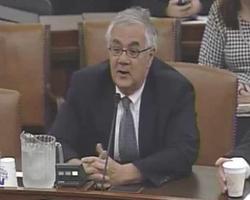






House Hearing Highlights Tax Benefits of Online Poker RegulationRep. Frank Says His Committee Will Vote on Poker Bill in July |
|
|

While online poker advocates continue to make the principled case for why the game should be recognized as explicitly legal (pointing out that adults should be able to do what they want with their own money, that this is a matter of personal liberty), there’s no denying that when the potential tax revenue is discussed, that’s when the mainstream media and major politicians fully take notice.
The tax implications of a hypothetically regulated U.S. online poker market was the topic of conversation for the Ways & Means Committee in the House of Representatives this morning, as the committee went over the tax revenue that the federal government would bring in if Rep. Jim McDermott’s (D-WA) and Rep. Barney Frank’s (D-MA) two poker-related bills were passed into law.
“Prohibition hasn’t prevented millions of Americans who want to gamble online from doing it,” Rep. McDermott said in the hearing. “It has forced Internet gambling operators to work offshore, it has put consumers at risk, and it sends billions of dollars in revenue to other nations.”
Based on a report from the Congressional Joint Committee on Taxation, Rep. McDermott estimated that online gaming regulation could bring in as much as $72 billion in federal ($42 billion) and state ($30 billion) tax revenue over the next 10 years.

The hearing was designed to focus strictly on the financial aspects of the proposed legislation, as opposed to the actual question of whether or not the market should be explicitly regulated in the U.S.
Rep. Sander Levin (D-MI) cautioned his fellow Congressional members of that fact as the hearing began.
“The issue of whether Internet gambling should be legal is not the subject of this hearing,” said Rep. Levin, who serves as chair of the House & Ways Committee. “We meet today to explore the tax implications of the proposal to legalize internet gambling.”
Rep. Levin went on to say that the hearing was crucial, in order “to get a sense of the size and scope” of the industry and potential benefits.
But that statement didn’t prevent his colleagues from giving their opinions on whether or not regulating the industry was a good idea from their perspective.
Rep. Bob Goodlatte (R-VA) was one of the leading voices against the proposed legislation.
“It is unfathomable that Congress would consider legalizing a currently illegal activity that imposes harm on the most vulnerable members of our society just to raise money for more big government spending,” said Rep. Goodlatte.
According to most gaming experts, there is no applicable federal law that makes playing online poker illegal. However, the Unlawful Internet Gambling Enforcement Act of 2006 puts the responsibility on the banks to prevent transfers to and from companies associated with illegal gambling. The UIGEA fails to define what is and what isn’t considered illegal gambling.

“We don’t believe that this is a case where prohibition works,” Rep. Frank said in the meeting. “We are talking about a decision by adults to do what they want to do with their own money.”
Rep. Frank, who spoke at the hearing as an invited guest since he is not a member of the House & Ways Committee, said that the House Financial Services Committee (of which he is the chair) would vote on his bill in July.
Both Rep. McDermott and Rep. Frank highlighted some of the things that federal and state governments could do with the added revenue that would come from their bills. In his bill, Rep. McDermott puts aside 25 percent of the potential federal revenue from online gaming for a program designed to help foster care children. Rep. Frank said that state governments could use their new revenue for a host of things, including the prevention of teacher layoffs when state budgets get tight.
There was no vote or mark-up of the bill in today’s hearing, as the meeting was strictly informational. However, the very fact that there was a hearing was seen as a major step forward by many people in the industry.
 “Today’s hearing underscores the increasing Congressional interest in a licensed and regulated online gaming environment,” said John Pappas, the executive director of the Poker Players Alliance. “While the robust consumer protections provided by the regulation are the biggest selling point, in the current economic environment, additional tax revenue derived from a licensed industry is certainly appealing as well.”
“Today’s hearing underscores the increasing Congressional interest in a licensed and regulated online gaming environment,” said John Pappas, the executive director of the Poker Players Alliance. “While the robust consumer protections provided by the regulation are the biggest selling point, in the current economic environment, additional tax revenue derived from a licensed industry is certainly appealing as well.”
In a press release from the PPA, Pappas did highlight one controversial area of the proposed legislation that his organization is trying to address.
“The PPA is working to remove language from the bill that would fine players who play on unlicensed sites as we firmly believe the unlicensed sites should bear the full consequences of not obtaining a license in the U.S.” said Pappas.
Online poker supporters will certainly be looking out for the next poker-related hearing, which should come in July based on Rep. Frank’s testimony today. If his committee passes that bill, the legislation could then go to the entire House for a vote. The House Financial Services Committee held an informational hearing on Rep. Frank’s bill in December.
The Massachusetts Democrat says that it is his goal and intention to pass this legislation as a stand-alone bill, but has said in the past that he would be willing to add it as an attachment to other legislation if necessary. That is how the UIGEA was passed in 2006, as the online gaming bill was a late add-on to a port security bill.
Rep. Frank’s bill currently has 69 co-sponsors.
